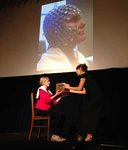 Narrowsburg
NarrowsburgLight Rain Fog/Mist, 43°
Wind: 8.1 mph
 Narrowsburg
NarrowsburgQuite naturally, that idiom popped into my head as I made my way to the Hurleyville Arts Centre last week to catch a presentation titled “Out of Mind.” Truth be told, I was hesitant. I …
Stay informed about your community and support local independent journalism.
Subscribe to The River Reporter today. click here
This item is available in full to subscribers.
Please log in to continue |



Quite naturally, that idiom popped into my head as I made my way to the Hurleyville Arts Centre last week to catch a presentation titled “Out of Mind.” Truth be told, I was hesitant. I had read that the evening was “a hybrid science lecture-performance that explores the neurophysiology of depression,” which gave me pause. It’s not that I’m shallow, but there are times that I want to just sit back and enjoy a good old-fashioned musical, rather than be intellectually challenged. That said, I know what I’m getting into when Tannis Kowalchuk calls, and I accepted her invitation to see the show, knowing full well that it wasn’t going to be anything like “The Sound of Music.”
Created and presented by Kowalchuk and Allison C. Waters, PhD, “Mind” is the collective brainchild of both. The two professionals are interested in exploring depression from vastly different vantage points which, on closer examination, appear to merge more than one might think. The program informed me that Waters is a clinical neuroscientist who “develops brain-based algorithms to guide treatment with neural implants for individuals with severe depression.” While I’m not entirely sure what that means, I noted that, in addition to her long list of academic accomplishments and degrees, Allison was an original member of NACL Theatre (co-founded by Kowalchuk in 1997) and collaborated with the company on several performances, which explained a connection that had eluded me.
“Dr. Waters,” the program stated, “continues to explore the territory shared by scientific inquiry and the performing arts with a mission to make brains more accessible to themselves.” Did I understand what that meant? Not really, but I felt sure that I wouldn’t be bored.
“Theatre has the power to transform us—body, mind and heart,” Tannis said. “I’ve seen it happen. I don’t suffer from depression. In fact,” she said, “I believe that theatre has saved me from it and that it is also a kind of medicine, one that builds community.” As promised, the presentation was an amalgam of both lecture and performance. As the program unfolded, enhanced by Michael Coney’s “sound art” and Dorene Warner’s graphic design, the theatricality of the presentation engaged the audience, and I felt as if we were sharing the experience, rather than sitting alone in the dark.
“I’ve seen it happen. I don’t suffer from depression. In fact,” she said, “I believe that theatre has saved me from it and that it is also a kind of medicine, one that builds community.”
Dr. Waters explained her work and why she and Tannis teamed up for the project. “Tannis is a theatre-artist,” Waters said, “and can express happiness, sadness, boredom and joy. It’s what she does.” That ability to convey emotions made it possible for Waters to look at the brain’s response to emotions through the use of electroencephalography, which involves placing noninvasive electrodes along the scalp. “It’s how we listen in on the brain,” Waters explained.
The performance wove theatrical moments featuring Shakespeare, movement, science and sound together with recreations of the clinical study, requiring Kowalchuk to run the gamut of emotions while machines measured her brain activity, as graphs and charts played on the big screen above. “We don’t really understand what depression is,” Dr. Waters had said during opening remarks, “but it’s my job as a neuroscientist to ask the questions. That’s why I invited Tannis to collaborate on this project. If she can express the words and emotions of people with severe depression for science to study, it might provide insight into the problem, and problems have solutions.”
Following the “performance aspect” of the program, both Kowalchuk and Waters fielded questions from the audience, which led to lively discourse, giving rise to even more questions in my (sometimes depressed) mind.
“If one person in this room feels less alone,” Waters said in conclusion, “then we will have accomplished our goal.”
“If one person in this room feels less alone,” Waters said in conclusion, “then we will have accomplished our goal.” A week later, I’m still reflecting on what was interesting, entertaining and thought-provoking. “Out of Mind” addresses depression, a condition that is often out of sight, in a a way that is (IMHO) dramatically new.
For information regarding future productions contact Tannis@willowwisporganic.com
Comments
No comments on this item Please log in to comment by clicking here